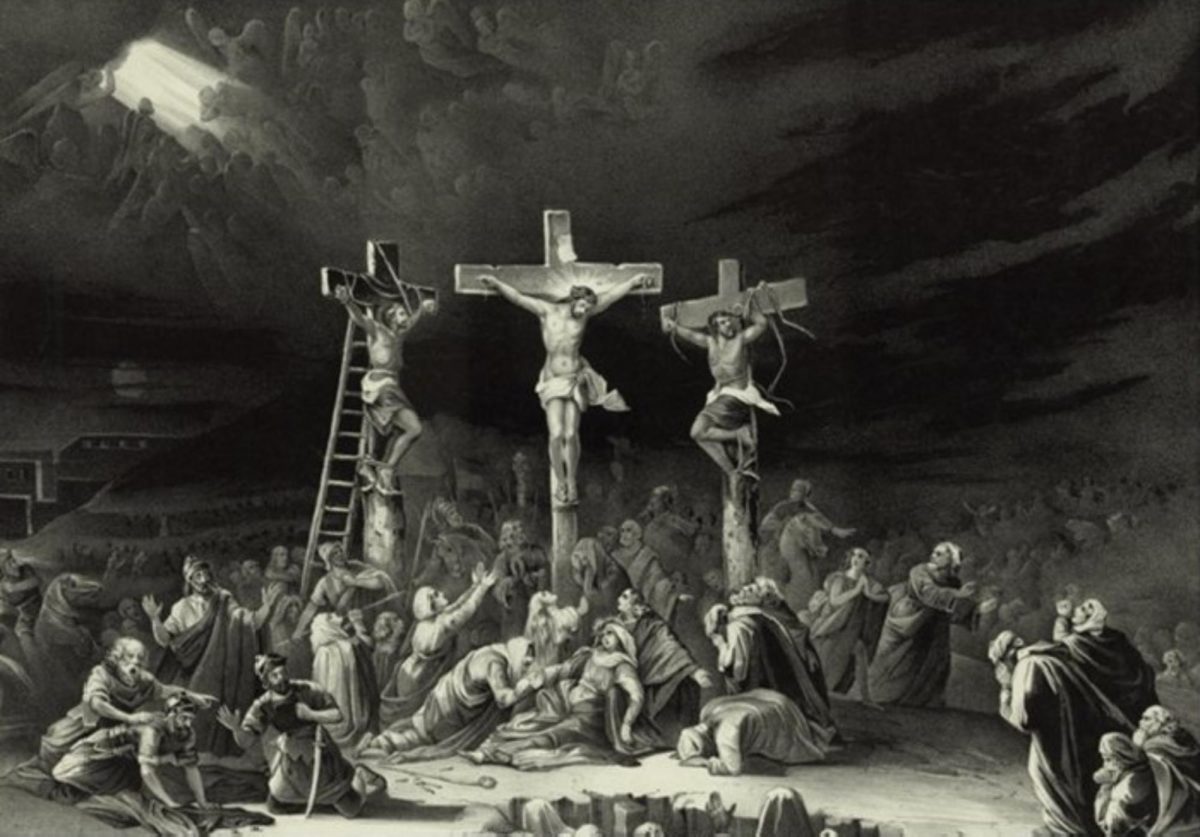JERUSALEM, ISRAEL – April 3, 33 AD* – “Son of God Dies…Rises Again” is a headline worthy of the front page of every edition of every newspaper for all time. Each spring, Christians around the world celebrate this the most profound event in human history. For the true believer, it is a safe assumption that this event crosses their mind every day, and even more so during this time of year. It is a time when we rejoice for the countless millions that have been brought to eternal life because of our Lord’s great mercy and powerful sacrifice. Indeed, we are told in Revelation 7:9-10:
“After these things I looked, and behold, a great multitude which no one could count, from every nation and all the tribes, peoples, and languages, standing before the throne and before the Lamb, clothed in white robes, and palm branches were in their hands; and they cried out with a loud voice, saying, ‘Salvation belongs to our God who sits on the throne, and to the Lamb’” (NASB).
This steadfast biblical truth is a cause of great rejoicing! For surely Heaven will be no ghost-town. Rather, it will be packed to the brim with the redeemed. Even so, we are also told in scripture:
“Enter through the narrow gate; for the gate is wide and the way is broad that leads to destruction, and there are many who enter through it. For the gate is narrow and the way is constricted that leads to life, and there are few who find it” (Mathew 7:13-14 – NASB).
Story continues below advertisement
If in the economy of Heaven an uncountable number qualifies as “few”, no doubt many billions will enter eternal destruction – Hell. As such, the Apostles’ question in Matthew 19:25 remains relevant – even to this day, “Who then can be saved?” (ESV).
In an effort to answer that question, we will examine the redemption of a notorious sinner. He was himself present at the crucifixion of Jesus. In fact, he was likely only a few feet away from Christ, and they both died on the very same day, possibly within the same hour. He lived a life of sin, rebellion, and blasphemy, and yet we know with biblical certainty that he is enjoying the glories of Heaven and Christ at this very moment. We know him as the second of the two criminals who were executed with Christ. Scripture gives him no name, so the for the sake of expediency in sharing his story, we will call him simply Javin*. It is through his story that I hope to show that Christ can save even the chief of sinners.
Let’s begin by asking the question, “Who was Javin?” The scriptures give us a major clue to his identity – the life of a man named Barabbas. Sometime prior to the crucifixion, a riot against the Romans had occurred in Jerusalem. During this uprising, Barabbas and his cohorts became guilty of murder and were imprisoned – sentenced to the brutal death of crucifixion (Mark 15:7). However, as was customary at Passover, the Roman governor Pilate offered the release of one prisoner as a concession to the people (John 18:39). His intention was that the people would choose Christ, who stood condemned by the religious leaders. Instead, they chose Barabbas. This brutal sinner was set free in the place of the Lord (which is a salvation story in itself), but his compatriots remained in prison – sentenced to death. Because Javin’s execution was scheduled to occur on the same day as Barabbas’, it is not unreasonable to assume they were connected. Further, from a Roman point of view at least, crucifying known rebels during Passover would have been a major deterrent toward future uprisings at a time when most of the Jews in the nation were in Jerusalem.
If this is true, perhaps the next question we should ask is, “How did Javin and his companion feel to see their leader set free while they remained condemned?” We do not know Javin’s thoughts specifically, but during the crucifixion we are told that, “One of the criminals who were hanged there was hurling abuse at [Jesus], saying, ‘Are You not the Christ? Save Yourself and us!’” (Luke 23:39 – NASB). This revolutionary showed absolute contempt for Christ. As a possible associate of Barabbas, he had probably had his fill of would-be messiahs. Jesus’ reputation had no doubt preceded Him, and, even if not, the commotion in the streets all that previous week would have certainly caught the attention of those imprisoned. Even the words of the disciples on the road to Emmaus indicated how wide spread the news of Christ was when they asked a disguised Jesus, “Are You possibly the only one living near Jerusalem who does not know about the things that happened here in these days?” (Luke 24:18 – NASB). Javin’s companion without question had some prior knowledge of Christ. Nevertheless, despite having this information – and in the face of his death – he chose not to believe. Rather, he verbally abused Christ and demanded an earthly rescue on his own terms. He offered not one word of repentance for his many sins and offenses before the Lord.
When exactly did Javin change his mind about Jesus? Matthew 27:44 states, “And the rebels who had been crucified with Him were also insulting Him in the same way.” (NASB). So, for a time, even Javin verbally abused and blasphemed Christ, but then something changed. We cannot say dogmatically when, but I choose to believe it occurred when Jesus said, “Father, forgive them; for they do not know what they are doing” (Luke 23:34 – NASB). Did Christ’s kind words toward those killing Him prompt Javin’s change of heart? I believe it is likely. After all, “…God’s kindness is meant to lead you to repentance…” (Romans 2:4 – ESV).
Javin’s words in Luke 23:40 make certain his change of heart, “Do you not even fear God, since you are under the same sentence of condemnation?” (Luke 23:40 – NASB). Javin’s rebuke of his companion prompts many questions about his personal theology. Did the phrase, “Do you not even fear God…” indicate that he knew that Christ was God? At the very least he knew Jesus was the Messiah, destined to reign.
Was Javin well versed in the scriptures? Did he know Isaiah 53:5, “But He was pierced for our offenses, He was crushed for our wrongdoings; The punishment for our well-being was laid upon Him, And by His wounds we are healed” (NASB). Had he also heard of or perhaps witnessed Christ’s miracles? We will not know for certain until we meet Javin in Heaven, but we do know for certain the Lord changed his heart.
For his very next word were, “And we indeed are suffering justly, for we are receiving what we deserve for our crimes; but this man has done nothing wrong” (Luke 23:41 – NASB). In his repentance, Javin acknowledged that his punishment was just. He admitted that he was guilty and did not deserve any mercy – no matter how much he might have craved it. In fact, he could have echoed the words of the priest Eli centuries earlier who had said when he learned about the prophesied deaths of his wicked sons in 1 Samuel 3:18, “He is the Lord; let Him do what seems good to Him” (NASB). Additionally, crucifixion was most often reserved for people the Romans wanted to make an example of such as rebellious slaves, pirates, political agitators, insurrectionist, and religious heretics. Javin was no doubt such a man, and in his agony, he acknowledged his guilt and considered himself worthy of the punishment he was receiving.
Also, in saying that “…this man has done nothing wrong…” he was also acknowledging Christ’s holiness. Perhaps he did not realize the extent of it in that moment, but he knew enough to realize that Jesus was receiving a punishment He did not deserve. This again no doubt impacted Javin as he realized, “But God demonstrates His own love toward us, in that while we were still sinners, Christ died for us” (Romans 5:8 – NASB).
Javin continued his repentance by adding faith to it, saying, “Jesus, remember me when You come into Your kingdom!” (Luke 23:42 – NASB). Javin had confessed his guilt. As it is written, “If we confess our sins, He is faithful and righteous, so that He will forgive us our sins and cleanse us from all unrighteousness” (1 John 1:9 – NASB). Javin had also acknowledged Christ’s holiness. As it is written, “This God—His way is perfect; the word of the Lord proves true; He is a shield for all those who take refuge in Him” (2 Samuel 22:31 – ESV). Now he addressed Christ intimately calling Him Jesus – not Lord, not Rabbi. These things were no less true about Christ but sharing His fate Javin called on Him with the intimacy of his name. Also, Jesus (Yeshua) means Jehovah is Salvation (BLB). Perhaps in this small way Javin was pleading with the Lord to save Him. In asking Jesus to remember him, Javin was asking for undeserved mercy, grace, and salvation when the kingdom of the Lord came.
And as He always does, the Lord offered it freely saying to the penitent Javin saying, “Truly, I say to you, today you will be with me in paradise” (Luke 23:43 – NASB). Like Martha, who upon her brother Lazarus’s death had said to Jesus, “I know that he will rise again in the resurrection on the last day” (John 11:24), Javin knew of the coming resurrection, and he knew that Jesus would be the King of that age. However, Jesus had responded to Martha, “I am the resurrection and the life; the one who believes in Me will live, even if he dies, and everyone who lives and believes in Me will never die. Do you believe this?” (John 11:25-26 – NASB). The resurrection is not merely some event in the distant future. Jesus Himself is the Resurrection!
Like all believers, Javin will be raised bodily on the last day before the Millennial Kingdom begins. However, Jesus spoke the truth when He said, “…today you will be with me in paradise…” (Luke 23:43 – NASB). The fact that the instant the believer dies they go to Heaven has been well established in scripture. Jesus had said Himself in Luke 20:38, “Now He is not the God of the dead, but of the living; for all live to Him” (NASB). Further, the Apostle Paul wrote, “But I am hard-pressed from both directions, having the desire to depart and be with Christ, for that is very much better…” (Philippians 1:23 – NASB). Javin was certainly about to receive something far better than the broken sinful life he had been living.
So, let’s briefly recap. Javin, a notorious sinner, received salvation and a warm welcome into the kingdom by the King Himself. As all sinners must, so far Javin had confessed his sin (1 John 1:9), repented of his sins (Matthew 3:2), believed in Jesus (John 6:29), called on the name of the Lord, (Romans 10:13), asked for undeserved mercy and grace (Luke 18:13; Hebrews 8:12), and humbled himself before the Lord (Matthew 23:12). It is important for everyone seeking Christ to know, “For by grace you have been saved through faith; and this is not of yourselves, it is the gift of God; not a result of works, so that no one may boast” (Ephesians 2:8-9 – NASB). Javin’s salvation was in no way an accomplishment of his own works. In fact, perhaps up until only a few hours before his death he was essentially a blasphemous murderer, and hanging on the cross, there were no pious deeds he could add to his account, even if they would have had any eternal value. Rather, by the grace and faith granted him by God, he received the gift of salvation and a joyous welcome into the kingdom.
However, perhaps you know the scriptures well enough to say, “But wait! What about baptism? Javin was never baptized. How can he be saved?” It is true that Javin was not baptized in the traditional way. But you must remember that the act of physical baptism is not a saving work – for there are no saving works apart from the works of Christ Himself. Rather, what is baptism? It is our public profession of Christ and our identification with His death.
Romans 6:4 (NASB) says, “Therefore we have been buried with Him through baptism into death, so that, just as Christ was raised from the dead through the glory of the Father, so we too may walk in newness of life.” Javin made a public profession of Christ, and he literally, not symbolically, died with Christ and was buried (in some form) the same day. Romans 6:6 adds, “…our old self was crucified with Him, in order that our body of sin might be done away with, so that we would no longer be slaves to sin…” (NASB). Javin was crucified with Christ, and his enslavement to sin was ended.
Also, do not forget that John the Baptist had said, “As for me, I baptize you with water; but He is coming who is mightier than I, and I am not fit to untie the straps of His sandals; He will baptize you with the Holy Spirit and fire. His winnowing fork is in His hand to thoroughly clear His threshing floor, and to gather the wheat into His barn; but He will burn up the chaff with unquenchable fire” (Luke 3:16-17 – NASB). In this sense, everyone gets baptized. The believer with the Holy Spirit, and the unbeliever with the fires of God’s wrath.
Since Jesus said, “Truly, I say to you, today you will be with me in paradise” I believe this declaration was Javin’s baptism in the Holy Spirit. Neither flashy nor loud, but a simple promise believed – and testified to until the end of time. Javin unquestionably received salvation. Like the Apostle Paul, he would have testified, “It is a trustworthy statement, deserving full acceptance, that Christ Jesus came into the world to save sinners, among whom I am foremost. Yet for this reason I found mercy, so that in me as the foremost sinner Jesus Christ might demonstrate His perfect patience as an example for those who would believe in Him for eternal life” (1 Timothy 1:15-16 – NASB).
May we all take comfort in this example. For we are all the chief of sinners in our own way. We have all given eternal offense to the holy God. Yet in His mercy He will save all who call on Him by faith. If you have lived such a life of evil that you believe you are eternally disqualified from receiving salvation, I call on you to reject that thought and cry out to God for mercy. Javin was an insurrectionist and likely murderer. The Apostle Paul was a persecutor of the church and sent Christians to prison and death. And yet God saved both and so many more like them. Who then can be saved? “Everyone who calls on the name of the Lord will be saved” (Romans 10:13 – NASB).
References
*April 3, 33 AD is one of several possible dates historians have identified for Christ’s crucifixion. It is used as a thematic part of this article, but should not be taken as a definitive historical fact.
*Javen is the fictitious name given to the repentant criminal is the novel Chronicles of the Imagination: New Covenant, which was also written by the author of this article. The name has been used for expediency in telling his story but should not be understood as his actual name.
Blue Letter Bible. Blueletterbible.org (accessed April 18, 2022).
Halley, Henry. Halley’s Bible Handbook with the New International Version. Grand Rapids: Zondervan, 2007.
Scriptures have been taken from the NEW AMERICAN STANDARD BIBLE ®, Copyright © 1960, 1962, 1963, 1968, 1971, 1972, 1973, 1975, 1977, 1995, 2020 by The Lockman Foundation. All rights reserved. Used by permission.
Additional scripture quotations taken from The ESV® Bible (The Holy Bible, English Standard Version®) copyright © 2001 by Crossway, a publishing ministry of Good News Publishers. Used by permission. All rights reserved.
Photo Credit
The title photo was created by Nathaniel Currier. The image is in the Public Domain and was provided via Wikimedia Commons. Thrive Christian Press makes no claim on this image.
This Post is Sponsored by:

Click the ad for more details.
The Believer’s Byline is a publication of Thrive Christian Press.
Copyright © 2022 David Scott Fields II. All Rights Reserved.










